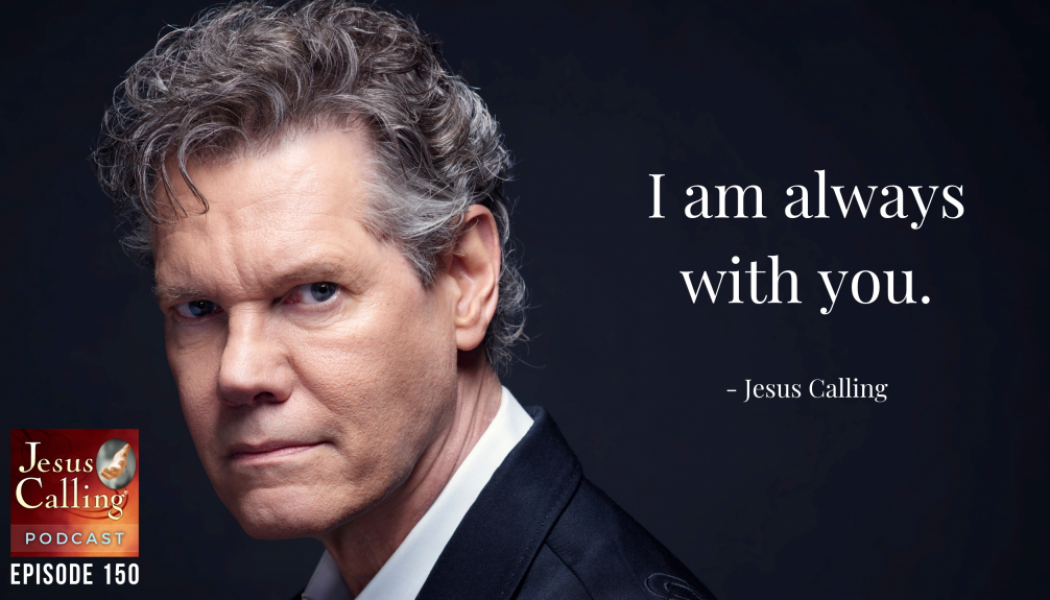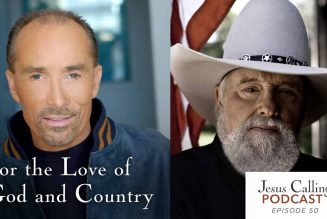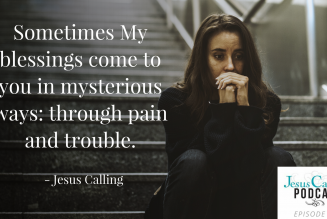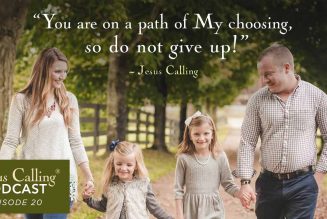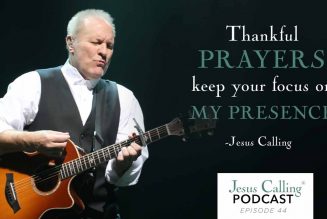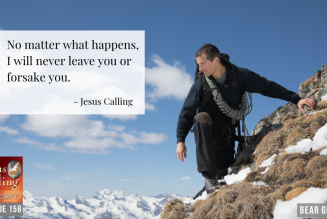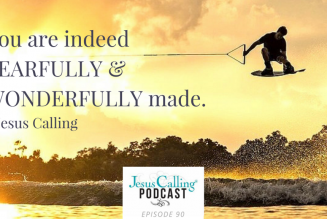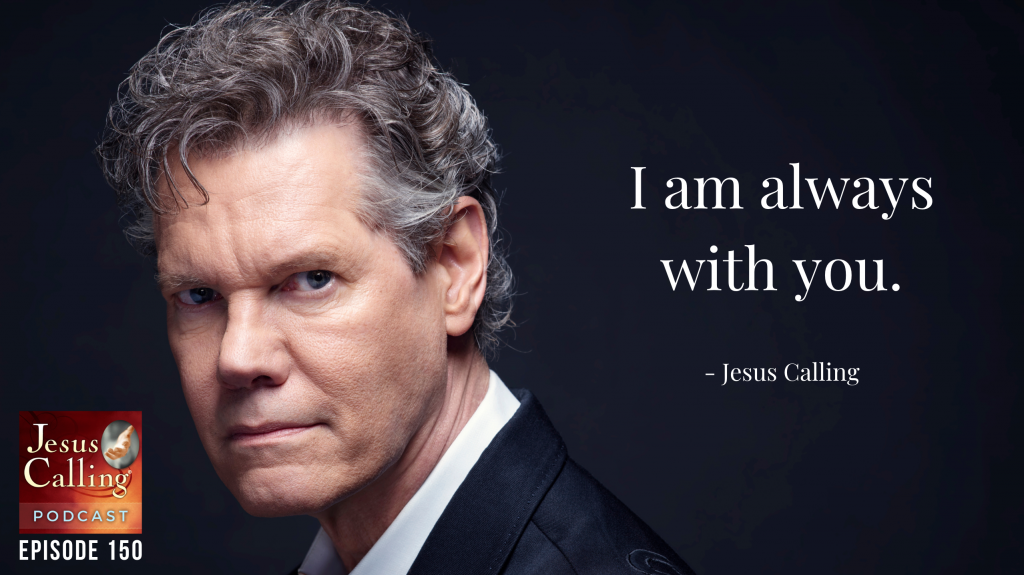
Mary: I think that a lot of the songs that people heard through the years were songs that were from [Randy’s] heart. That was his way of getting away from the anger and the bitterness and the tough parts of childhood, and he was able to sing his life through song. And I think through that, he found so many other people related.
Faith & Family Help Us Find Our Way: Randy & Mary Travis and John Berry – Episode #150
Narrator: Welcome to the Jesus Calling Podcast. Our guests today are two music artists whose faith—and the faith of their families—sustained them during times of success and times of suffering: legendary country music artist Randy Travis, and his wife Mary, and country music singer and songwriter John Berry.
First up, Randy Travis’s rise to fame included 20 studio albums which yielded 16 number-one singles. After his big breakout in the 1980’s and his continued success in the 90’s, Travis went on to record several Christian country records as well, and his song “Three Wooden Crosses” earned the 2003 CMA Song of the Year award and a GRAMMY award for Best Male Country Performance. Randy and Mary share about Randy’s early years in music, his recommitment to his faith, and how they clung to God when a devastating illness threatened Randy’s life.
Humble Beginnings in North Carolina
Mary Travis: I’m asked to speak for Randy. And everybody knows Randy Travis, a great American, a great country singer who also made his mark in an acting career with over forty-six movies.
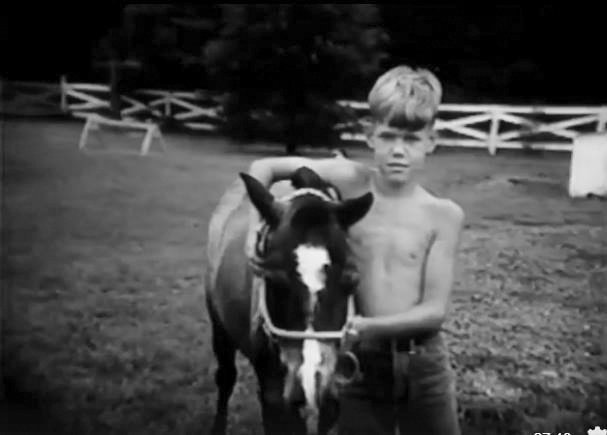
But it all started in Marshville, North Carolina, that’s where he was born and raised. There were six children in his family, and he had a sweet, sweet mama that kind of developed the softer part of their hearts. I think if you ask any of his brothers and sisters, they’ll tell you the same thing.
And Daddy was a little bit rougher. He was tougher on him. It was a farming family. He raised horses and cows, and at one time had turkey houses.
Mama was kind of the moderator between Dad and the kids.
Randy Travis: Yeah.
Mary: And it was tough sometimes, real tough. But I think that that’s where he got his soft side and the gracious side.
You know that goes back to “When Mama Prayed.” When he sang that song, it just meant so much to him because he remembered Mama praying and going to church by herself and hoping Daddy would show up eventually.
Don’t you think that he just wanted music in the house, right?
Randy: Yeah, yeah.
Mary: He loved music, right?
Randy: Yeah.
Mary: And I think that his daddy, it seemed like from what I know—of course, I wasn’t there back then—but it seemed like his daddy put a horse under their backside and an instrument in their hands long before he knew that there might be a talent.
So he insisted—you said “forced.”
Randy: Yep.
Mary: He gave you an instrument and said, “You will play an instrument.” And none of them really sang, so Daddy got to the point where he said, “Okay, somebody in this house is going to sing!”
Daddy loved to sing, and he cut an album or two early on—not an album, but a song or two, right?
Randy: Yeah.
Mary: Nobody else was singing. And [Daddy] told Miss Kate Mangrum, when he sent Randy and Ricky for guitar lessons—Randy 9, Ricky 10—he said, “One of you is gonna sing.” And neither one of them wanted to sing, they just wanted to play the guitar. So by default, since he was younger, [Randy] had to start singing.
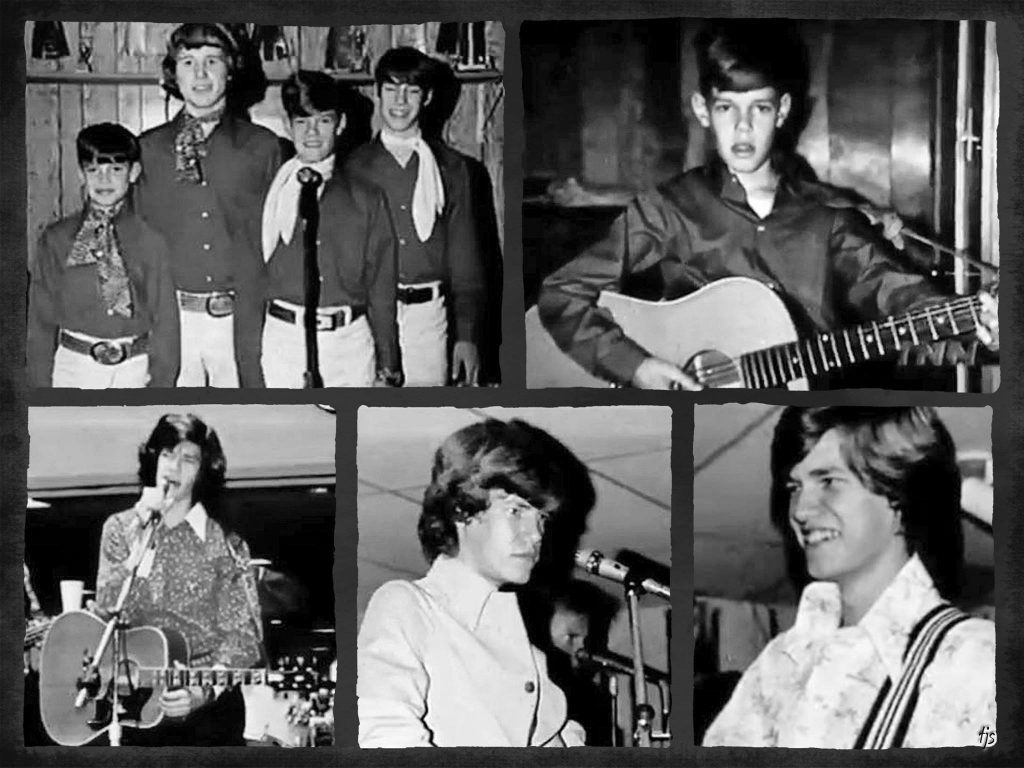
As soon as he opened his mouth, Miss Kate said, “We’ve got something special here.”
So at that point in time, I think they all thought, Wow, this is the “aha” moment. So that’s where it did it started—under duress, I think.
Randy: Yeah.
Mary: And I think Randy, he always said, “I’m so glad that he did that.”
You know he and Daddy but butted heads a lot.
Randy: A lot.
Mary: He’s always said, “I was so glad that Daddy forced me to sing and play the guitar, because that’s where I found my way out.”
He and Ricky started playing in fiddlers’ conventions and the VFW, local places, and started winning ribbons. And that’s when Randy said that he started figuring out that, Maybe there’s something here. Maybe I have something unique, and maybe I have something that I can offer the world outside of the city limits of Marshville.
He loved Marshville and the people there. He just knew that he needed to get out.
Staking a Claim in Nashville’s Old Country
Mary: Nashville was an exciting time for [Randy], and he worked there at the Nashville Palace.
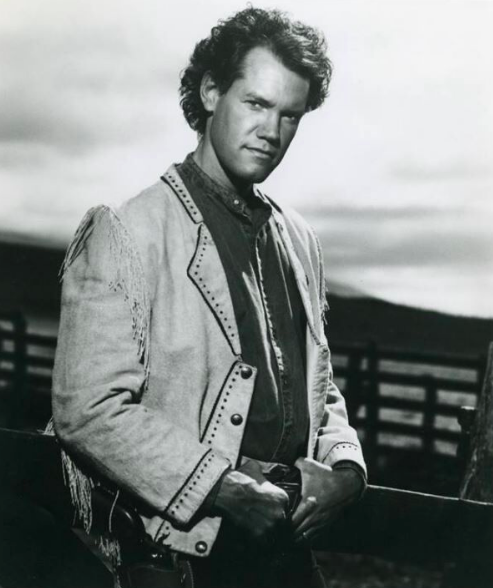
John A. owned Nashville Palace at that time, and so he gave Randy a job cooking and cleaning and bussing tables. He did the plumbing, and he did landscaping, and he did construction work. He did a little bit of everything just to make ends meet. He stood at the door and he knocked.
Randy: Yeah.
Mary: And he was ever so patient while he stood there and he knocked. He did what he had to do to finally get his songs heard. God answered the door, eventually, but it was a testing time. And those are always good for us.
Country music had kind of gone the way of “urban cowboy”—more pop. His love for music, obviously, came from his dad, and they loved the old traditional country music: Hank Williams, Sr., Vern Gosdin, and George Jones. Just that old country music is what he loved so much. That’s what he was determined to stick to, to bring back.
And then of course, he’s like so many of them that go to Nashville: they kind of get tilted towards whatever radio’s playing or whatever the label says they need to be doing. They tried to do that with Randy, and he said, “Right now, it’s traditional country music. I can’t be anything else but that.”
He stuck to those guns. And again, thank goodness for that, because not only did he get his songs heard, but like Garth [Brooks] says, “[Randy] kicked the door open and he nailed it to the floor for us,” because there were a lot of them out there singing traditional country music, but nobody was hearing them.
When Randy came along and “1982” came out and hit number one, soon thereafter Warner rereleased “On the Other Hand,” and that when people started going, “Oh, that’s country music.”
If you just go and talk to some of the other guys, they’ll tell you. Dwight Yoakam, we just saw him last week.
Randy: Yeah.
Mary: He said the same thing. He said, “Man, it’s such an honor to be with you this many years down the road. Thank you for doing what you did.”
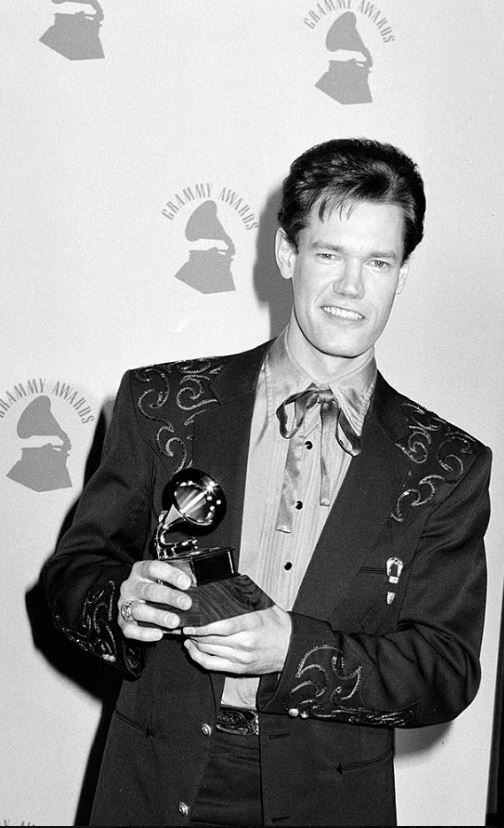
I think that’s so gratifying when we’re at this place in our life, and you’re kind of standing on the distant shores and looking back and recognizing the ripples that you made. It’s nice when we get around some of his friends and his fellow country artists tell us that. It’s always nice when you find that you’re not alone.
[Randy] found out that people loved his songs. And the more he heard that it touched somebody, the more inclined he was to sing a new song, write a new song. So I think that’s why now, as we look back in retrospect, we have such a beautiful catalog of Randy Travis music straight from the heart.
“The more [Randy] heard [his music] touched somebody, the more inclined he was to sing a new song, write a new song. So I think that’s why now . . . we have such a beautiful catalog of Randy Travis music straight from the heart.” – Mary Travis
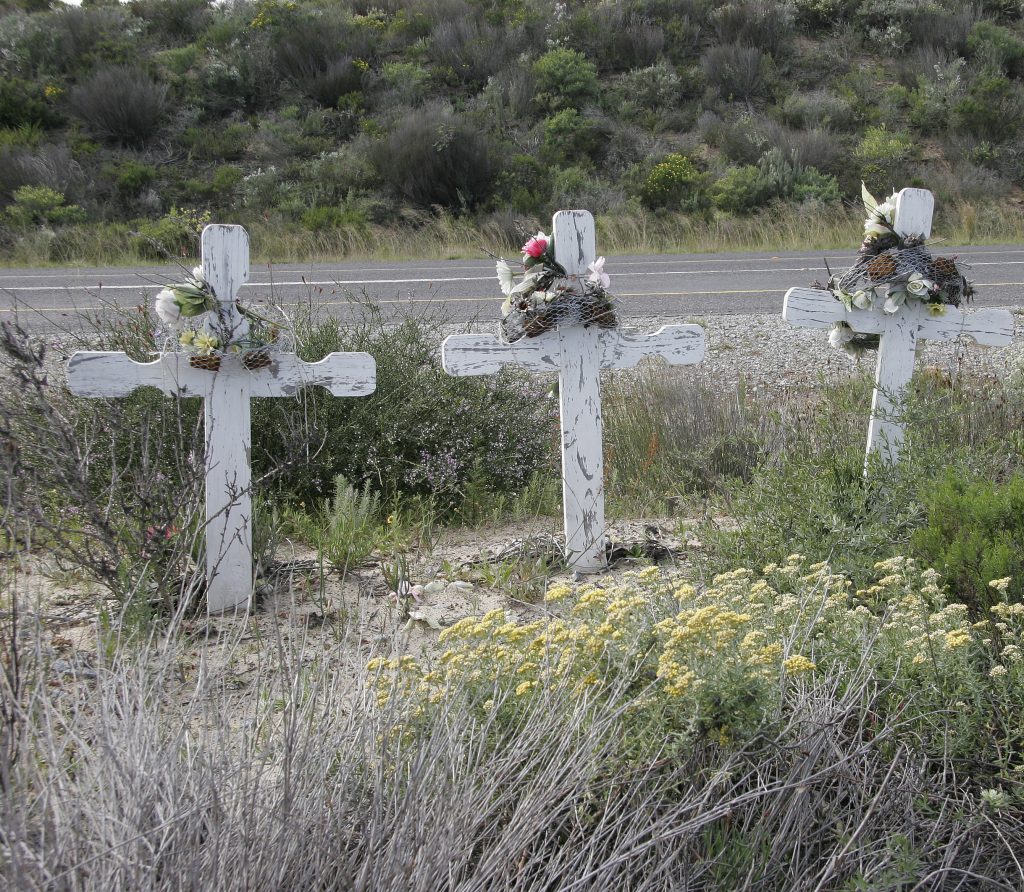
Sharing Faith in “Three Wooden Crosses”
Mary: God worked some wonderful things in Randy’s heart.
It was in the early 90s. [He and his first wife] were living in Ashland City, Tennessee, and they were going to a church there in Ashland City. I think it was church of Christ. Was it Pastor Harless that was there?
Randy: Yeah.
Mary: And [Randy] knew that that was something he needed to profess, to try to leave some of the old stuff behind.
He went in, and Pastor Harless baptized him that Sunday night, I think, wasn’t it? So once he made up his mind, he knew that that’s the direction he wanted to go.
He had done an album called Rise and Shine. They’d finished the album and Kyle was mixing it. And somebody—I wish I could remember the name—they gave Kyle [the song “Three Wooden Crosses”] and said, “This is for Randy’s voice. This song needs to be sung by Randy.”
And Kyle said, “Are you sure? It’s a great song.”
He said, “No, it’s Randy’s.”
And here’s another angel that comes along in your life, and he unselfishly gave Kyle that song to give to Randy.
Randy took it with him and he was . . . I think you were on the treadmill or the bike or something. He had his headphones on he listening to it, and he listened to it two three times. He got off the treadmill or bike and called Kyle and said he said, “We’re going back in the studio. We’re putting this on the album.”
Kyle’s like, “Hoss, we already finished this album.”
[Randy] says, “No, this is going on this album.”
So that was why it was the last track on Rise and Shine, and it turned out that it worked out for him. What a song. And it just crossed all the genres. It brought a lot of people together. It wasn’t just country. It wasn’t just gospel.It just spoke to everybody. Everybody could relate to it.
[embedded content]
Mary: It did touch a lot of lives.
I’ve read it was a Reverend Coffindaffer, if you can believe that, Reverend Coffindaffer was the one that started putting crosses on the side of the road for people, memorials. And so we have three wooden crosses here in the front entryway [of our house], and they were carved out of a triple-trunk cedar tree by a gentleman that lives a little bit west of us. He had lost his daughter too. I believe it was a drunk driver, from what I understand, and it was a traffic accident. And he went quiet, he went dormant. He didn’t know how to understand or how to deal with that kind of pain.
And so at one point, he found this tree, and like I said, it had a triple trunk. He started to spend a lot of time out on his land by himself after his daughter’s passing and started making these crosses. So once he found this triple-trunk, it was kind of his mission, from what I understand, to find Randy to make sure that he got the three wooden crosses in memory of his daughter. He carved Randy’s initials in the side. And it’s just a constant reminder to me, and I think to you, [Randy], every time we look at it how truly blessed we are.
Trusting God in the Fight for His Life
Narrator: Randy’s life and music has had an impact on millions of people. The strength he showed in his career and the faith that inspired him would be something that he would draw from as he and Mary faced one of the most challenging experiences of their lives: a devastating stroke that almost took Randy’s life.
“Randy’s life and music has had an impact on millions of people.” – Mary Travis
Mary: We made a good team going through it. It’s one of those things—I’ve told people, “It’s a crash course. It’s not anything that you are ever prepared for. It doesn’t matter how many years of school you have, you can never prepare for a calamity like that.”
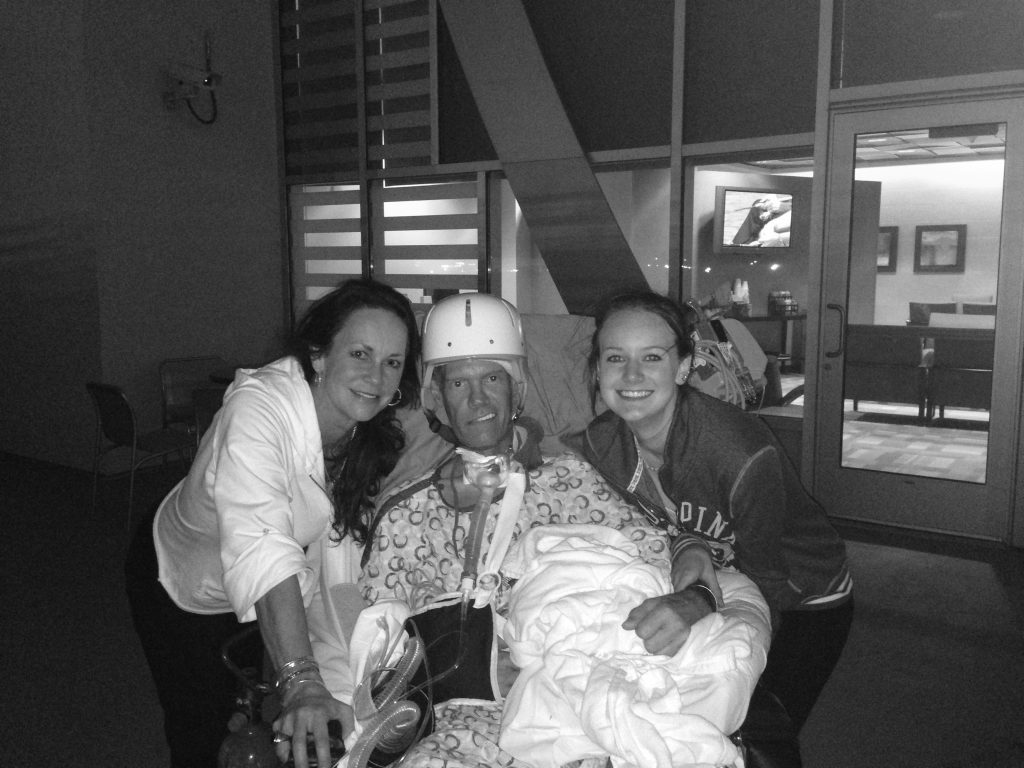
It happened overnight, as far as we knew. There were things going on with the heart, with the viral cardiomyopathy that Dr. Mac had educated us on after the fact. It had been going on probably for five weeks, but we didn’t know. And by the time we got to the hospital, the heart was shutting down, and it had done its damage.
So that’s when [Randy] flatlined, and it was all within 24 hours that we went from packing a bus to go on the Canada tour to being in the hospital for almost six months. So it was overnight, and it was rapidfire.
He got down to right below 100 pounds. He was on feeding tubes. He was on IVs. He had two brain surgeries. He had several tracheotomies. He was intubated. He was on ECMO, which is life support. Then when you think you’re out of the woods, then he had the three hospital-borne bacterial infections, and that’s when they said, “There’s nothing else we can do for him. There’s no way he can survive these. We can’t get on top of a staph infection. It’s a hard decision, but you just need to think of maybe letting him go.”
I went into the room, and I just sat down and talked to him. I said, “Honey, if you want to keep fighting this fight, let me know. I need to know.”
And there was the sweetest—it was a moment I’ll take to my grave. I was holding his hand, and he squeezed it. And I will never forget this sweet, sweet tear [that fell down his face], and I knew that he wanted to keep fighting at this point.
He was semi-comatose, but he knew what was going on. He knew exactly what was going on. And I knew then that he wasn’t ready to give up.
So I was kind of like a mama bear, at this point in time, just telling them, “We’re gonna give it all we’ve got, and I’m watching every move you’ll make. You just gotta give this guy a chance.”
God wasn’t through with Randy. He wasn’t through with what Randy could do in this world and the difference that he could make in lives.
I did a lot of praying. And this Jesus Calling, it was so interesting to me. I remember my brother Stubbs, who made the shirts that Randy wore, he and his wife gave me a copy. He and Holly gave me a copy of Jesus Calling. Denise and George and Luke, Luke’s our godson, they brought us Jesus Calling. I think within the first week of being there, I had six Jesus Callings. Everybody that came brought a Jesus Calling. I had the leatherbound one, and it came in all shapes and sizes.
I know that at the heart hospital, there were people that would come in, of course, with heart attacks and triple bypasses, and they didn’t know yet if they were going to live. I’ve shared four or five of my Jesus Callings with people.
It was just one of those things that it helped me get through those times because I could turn to any page in there and read something that gave me some strength and helped me to understand that what we were going through, we weren’t alone.
Narrator: Right before Randy and Mary left the hospital to head back home, they opened to the Jesus Calling passage for that day, November 16th, and found strength and comfort for the days of recovery that lay ahead.
Mary: It says,
As you look at the day before you, you see a twisted, complicated path, with branches going off in all directions. You wonder how you can possibly find your way through that maze. Then you remember the One who is with you always, holding you by your right hand. You recall My promise to guide you with My counsel, and you begin to relax. As you look again at the path ahead, you notice that a peaceful fog has settled over it, obscuring your view. You can see only a few steps in front of you, so you turn your attention more fully to Me and begin to enjoy My Presence.
The fog is a protection for you, calling you back into the present moment. Although I inhabit all of space and time, you can communicate with Me only here and now. Someday the fog will no longer be necessary, for you will have learned to keep your focus on Me and on the path just ahead of you.
So we leaned hard on Him. We leaned real hard on God. And I know that a lot of nights over in my little hospital cot, or chair, or whatever was there talking to God and saying prayers, there was a newness in me as far as my faith. But I always asked Him, I said, “God, just please give him back to me.” And He was faithful. God was faithful.
I am so grateful for that for that unspoken relationship that we have. I can tell him all day how much he means to me, but he can’t tell me that. I think early on that frustrated him a little bit and you would get a little upset.
Randy: Yeah.
Mary: And there were times when you were pretty down for a while. But since then, I think we’ve kind of adjusted to our new life, and we’re okay with that.
You learn to laugh. I think that’s that’s one of the things that everyday, we try to find something to laugh at. Or us—we laugh at ourselves more than anything, right? But we do we find something to laugh about.
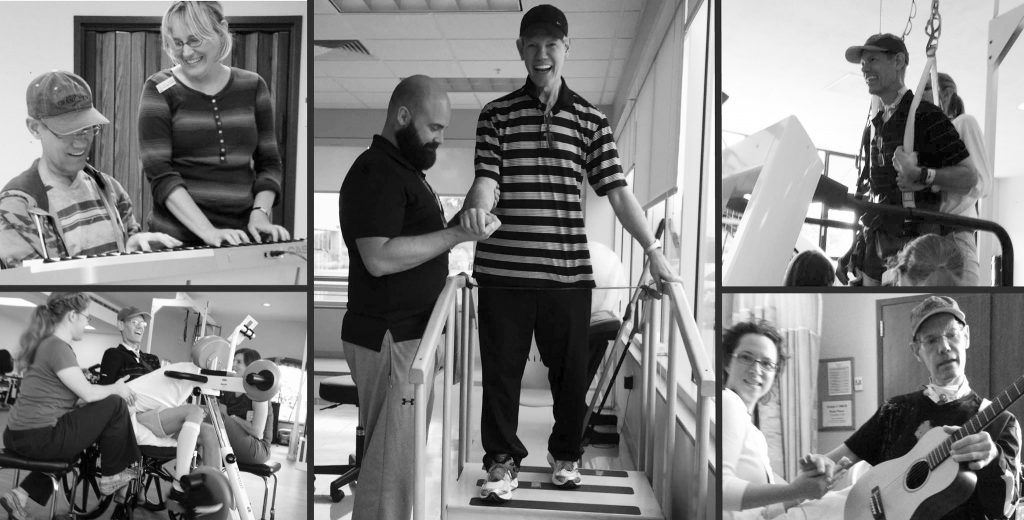
I think the great thing about love is that you know the worst about each other, but you only see the best. You forgive. You keep God in the middle of all of it because there’s days when you don’t understand each other. There’s tough days. There are still tough days. But you know, we go to bed, we wake up, and we smile. You forgive, you forget. You go on.
“I think the great thing about love is that you know the worst about each other, but you only see the best.” – Mary Travis
And life is still good. It’s just different.
Narrator: Randy has a new book that gives deeper insight into his story called Forever and Ever Amen: A Memoir of Music, Faith & Braving the Storms of Life. It’s available wherever you buy books.
Stay tuned for our next interview with country music artist John Berry after a brief message about a free offer from Jesus Calling!
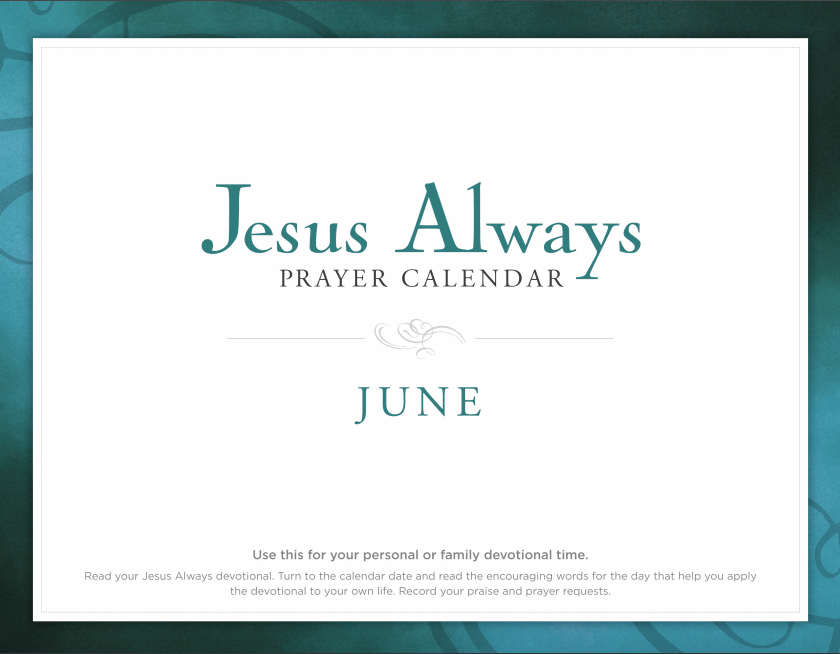 Are you looking for a way to keep track of your daily prayers along with Jesus Calling? The Jesus Calling family prayer calendar goes right along with your daily readings from Jesus Calling. Each day begins with a guided reflection, followed by a space for you to fill in your prayers of thanksgiving and special requests. You can get your free Jesus Calling Family Prayer calendar by visiting JesusCalling.com/offer
Are you looking for a way to keep track of your daily prayers along with Jesus Calling? The Jesus Calling family prayer calendar goes right along with your daily readings from Jesus Calling. Each day begins with a guided reflection, followed by a space for you to fill in your prayers of thanksgiving and special requests. You can get your free Jesus Calling Family Prayer calendar by visiting JesusCalling.com/offer
Narrator: Our next guest is country music singer and songwriter John Berry. John’s love for music was planted in his heart from an early age. When he was just 20 years old, he cut his first independent album, but a short time later, his family was devastated by tragedy. John watched his family move through grief with God by their side, something he would remember a decade later when, at the beginning of his rise to fame, he experienced one of the darkest moments of his life.
John Berry: My name is John Berry. I sing songs and write songs, and ride around on my bus and sing for more people.
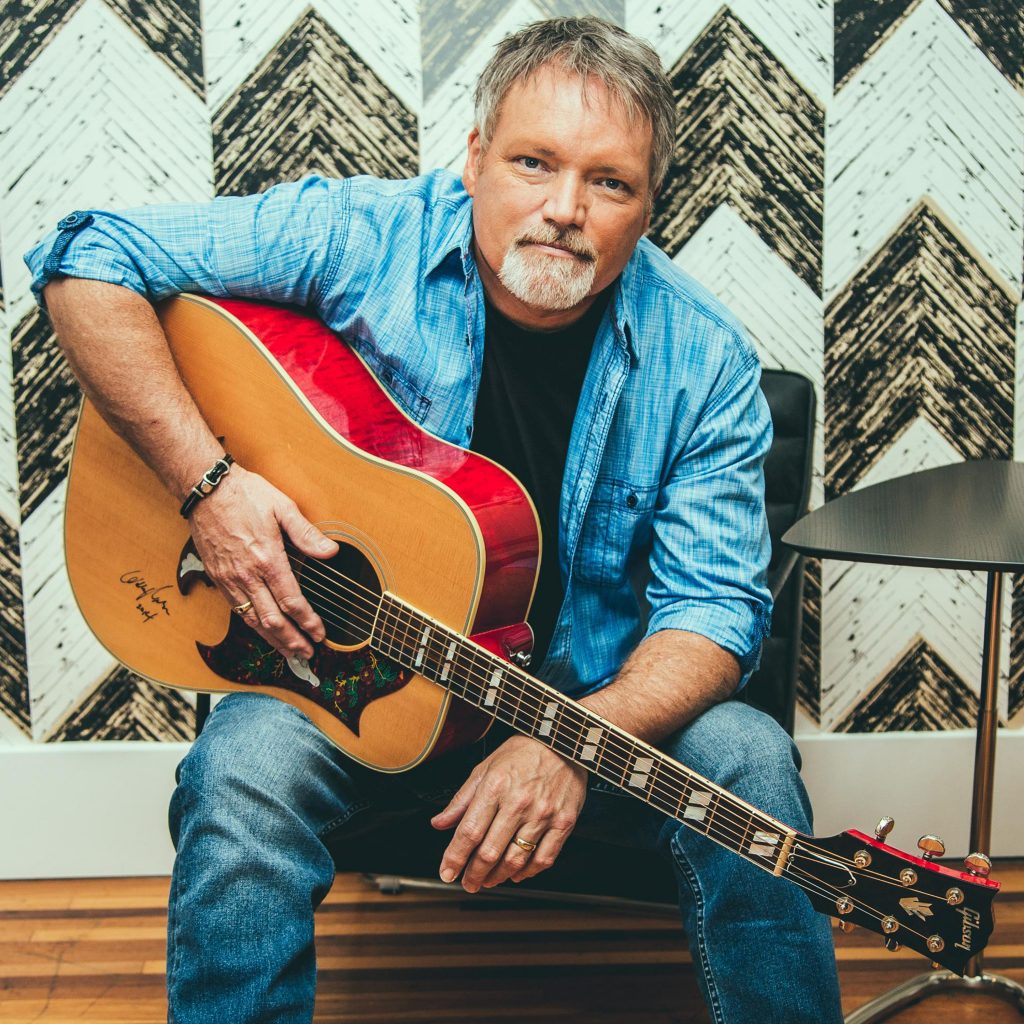
I’m originally from Aiken, South Carolina. I grew up in a wonderful home with dear parents, sweet parents. My mom Marie was a sweet, sweet soul. My dad Jim loved us. He was a hard working man. Worked construction as long as I can recall.
He was a godly man who poured into his family, his kids. He would always read the Bible to us at dinnertime. And turns out, the book of Proverbs is 31 chapters, and most months have got pretty close to 30 days. So we got a chapter of Proverbs a day, whether we thought we needed it or not.
As I got older, I realized how important that really was. There’s something about that pouring in of God’s Word to our heart that—it absorbs into us and becomes part of our spiritual DNA.
Moving Through Tragedy at a Young Age
I grew up in a real musical home.
My mom had a lovely voice, and my sister had a lovely voice, and she sang lots of stuff she heard on the radio growing up. She and my brother would sing at our church youth group. My brother learned to play the guitar when he was in his early teens, I guess. And me, being the younger brother, I often did what the older brother did, and so I learned to play the guitar as well.
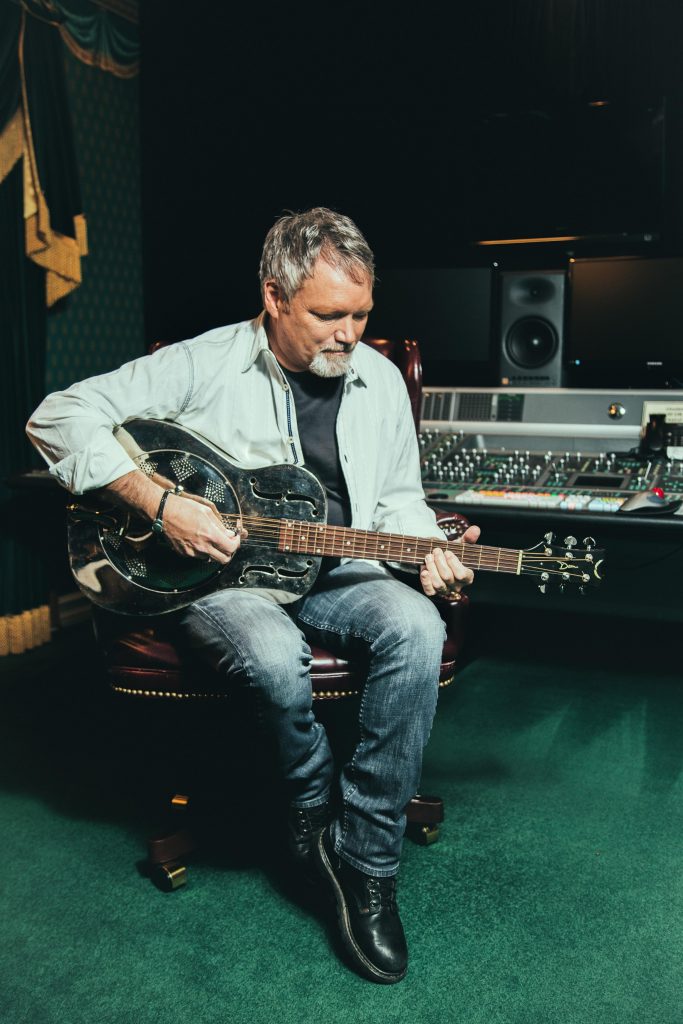
I cut my first little independent record in summer of 1979. I guess two years later, my mom passed away. That was a pretty hard thing to understand and cope with as a young man.
But you know, to watch my dad go through that, to watch him grieve and watch him to lean on Christ and to get up in the morning to deal with face and every day, it was quite a lesson to see my father cling to Christ throughout that time of his life.
“To watch [my dad] grieve and watch him to lean on Christ and to get up in the morning to deal with face and every day, it was quite a lesson to see my father cling to Christ throughout that time of his life [after my mom’s death].” – John Berry
Fall of ’81, November 8th, a lady ran a stop sign and hit me on my motorcycle and broke both my legs, and I couldn’t go back to the job I had. I was working at a little factory in northeast Atlanta. I couldn’t go back to working on that concrete floor and doing the assembly thing, but I could sit on a guitar sit on a stool and play a guitar. And so that was the very bright silver lining to that very dark cloud, and so that’s what kind of got me into music full time.
I ended up doing six independent records before I signed with a major. And in 1990, I got my last independent Saddle the Wind and moved to Athens. That’s when things really started to turn into something.
I played clubs in Athens for eight years, and we developed quite a following. That was a lot of fun. We had so much fun.
I was coming home from playing in a club in Athens late at night, early in the morning, and a song came on the radio. It was a new song by this country artist Joe Diffie. It’s a song called “Ships That Don’t Come In.” And I don’t know what it was—I’ve always loved Joe Diffie—and I turned the volume up, listened to Joe sing this song. He sang the line: “And to those who stand on empty shores and spit against the wind, and those who wait forever for ships that don’t come in.” It hit me. It hit me light a freight train.
I got home, and I woke my wife Robin up. I told her about the song, so we sat up all night and came up with a plan to go to Nashville.
May of 1992, we did our first industry showcase at Douglas Corner. We sent out 250 invitations, and one guy on that list showed up, Herky Williams. And Herky worked for Jimmy Bowen, who ran Capitol Records.
He was so excited we were there. Herky had heard about me from his sister, who went to the University of Georgia. He had come to Athens a couple of years prior to hear another band, and while he was there he came by to see me, and there was a line down the street. He came by twice, and he couldn’t get in. So when he saw I was playing in Nashville, I really piqued his interest, and they put a private showcase together for Bowen. Then we did the deal on it was pretty awesome.
Bowen signed me to Capitol, put my first record out, and my first single got in the top 40. The second single got in the top 15. The 3rd single, we were really hoping to get some legs because if it didn’t, I’d probably be out the door. But it got to number one: “Your Love Amazes Me.”
[embedded content]
“I woke up, and I was me.”
Narrator: As John began to see his dreams of being a Nashville country music artist unfold before him, something else he didn’t expect was happening in his life. As he struggled to identify the source behind the debilitating headaches he was having and his loss of appetite, he also began to pull away from the people he loved.
John Berry: It was weird. Robin was pregnant with our second child Sean, and I sent them home. They were kind of crowding my space.

I quit calling home and quit going home. I’d just stay on the bus, stay in the hotel. I found out later every time I was off the bus, the guys in the band would go rummage through the back room, trying to find the drugs they knew I had to have been on because I was losing so much weight and was so sick all the time. I turned into some evil dude.
“I found out later every time I was off the bus, the guys in the band would go rummage through the back room, trying to find the drugs they knew I had to have been on.” – John Berry
I was in Washington D.C. in April of ‘94. Robin found me at the hotel and got a hold of me. She said, “Sean’s gonna be born today.” She was headed to the hospital. And my response was, “Oh that’s great. Let me know how it goes.”
About 10 minutes later, my road manager gets a phone call from my mother-in-law, Carol. When Carol speaks, people listen. And she said, “I don’t care what he’s doing. You get him on a plane home today.”
I don’t remember flying to Atlanta. I don’t remember renting a car. I don’t remember driving to Athens.
I do vaguely remember going to the hospital and walking into Robin’s room, and she said she hardly recognized me, I looked so different.
She asked if I would take Sean back to the nursery, and I reluctantly did. I was walking back down the hall towards her room and didn’t want to go in, I felt so bad. I sat down on the floor, and a nurse walked by who knew me and she said, “John, are you okay?”
All I know is I was on a gurney going really fast to the emergency room. They did a CAT scan, and they found what they thought was a keloid cyst in the third ventricle of my brain. It had gotten so large that—we’re talking about the-end-of-your-pinky large, but inside your brain, that takes up a lot of room. And it had gotten where it blocked the fluid draining down the spinal column and caused the fluid to build up around the brain.
They said, “We’re going to do a craniotomy Monday morning and basically take the top of your head off, move your brain over, and go get this thing out of there.”
I said, “Great. I’ll see you Monday morning. I’ve got to fly back to D.C. I’ve got a show to do Saturday night.”
He said, “No, no, no, no, no. You’re not going anywhere. You don’t understand—you’re having brain surgery. You’re not going anywhere.”
And they did that [surgery], and I woke up and I was me.
My wife Robin had to go from being basically abandoned to being my nurse, as well as the mom of a brand-new newborn and the 4-year-old she already had.
She couldn’t have done it without the love of Christ. It just couldn’t have happened. So I have to think our Heavenly Father every day for the love this woman has for me.
“I have to think our Heavenly Father every day for the love [my wife Robin] has for me.” – John Berry
A Song for Beautifully Broken
Narrator: John’s recovery and the healing of both his body and his relationships validated the trust he already had in God, and he found himself in pursuit of things that spoke to his gratefulness and increasing faith. One of those projects was lending his voice to the title song of the inspirational film Beautifully Broken.
John Berry: Well, the movie was produced by Chuck Howard. And Chuck is the guy that produced all of my records that you’ve heard on the radio.
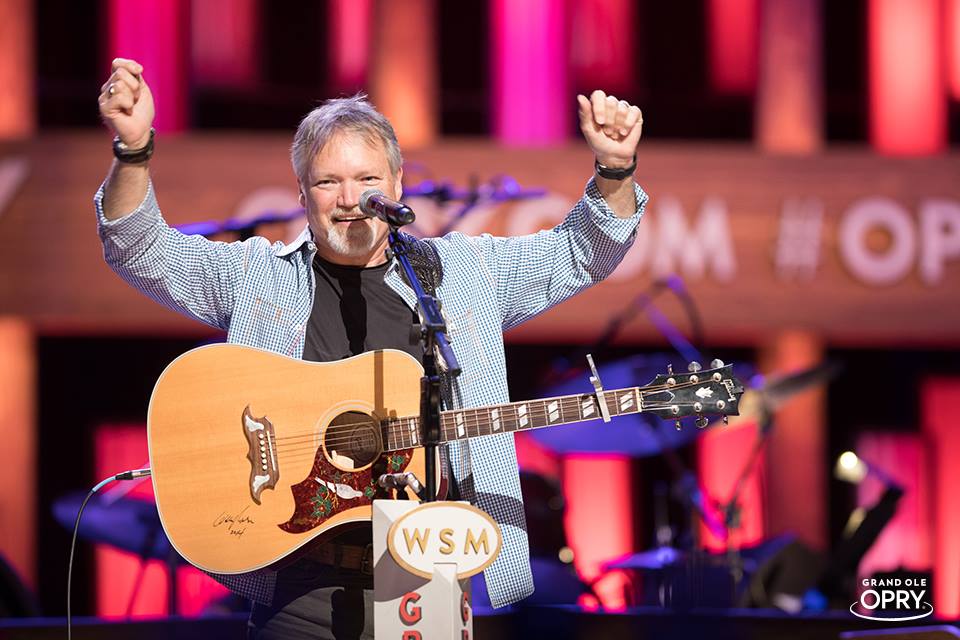
A few years ago, he became a Christian and just felt that he needed to go do something else. He ended up making inspirational films, and he had this movie in the works called Beautifully Broken. He sent me a rough edit and a note said, “Let me know what you think about this. I’ve got a song I’d like for you to sing in this film.”

It takes place in 1994, and it’s the genocide in Rwanda, Africa. And the storyline is, there’s these three families—two from Rwanda and a family from Brentwood, Tennessee—and how God weaves this tapestry where they save each other’s lives. And at the end when it all comes together, it’s like, “You’re kidding. Wow.”
And so I called Chuck and I said, “I haven’t heard the song yet, but if me lending my voice will encourage anybody to see this film, I’m in.” And then I heard the song. “Oh wow, you’re kidding me.”
I can’t say enough about it. It’s really just a gift.
Narrator: You can see when John Berry is performing at a city near you at johnberry.com. The movie Beautifully Broken is now available on DVD.
[embedded content]
Narrator: If you’d like to hear more stories about people living their faith in the spotlight, check out our interview with country music singer Josh Turner.
Narrator: Next time on the Jesus Calling Podcast, we talk with legendary Christian music artist and songwriter Steven Curtis Chapman and his daughter Emily Chapman Richards. Steven and his wife Mary Beth founded the orphan advocate organization, Show Hope, which exists to help adoptive families and children during all stages of the adoption process, which Emily now runs on behalf of the family. Steven reflects on the grace God gives parents in raising their children.
Steven Curtis Chapman: I think Emily even talks about this as a mom now: you know, it feels like the jury is out until we stand before Jesus—which then, thankfully, it’s all gonna be grace and all of that. But it’s like, I don’t know if I did it. I don’t know if I did it right, if I did it well. I see some moments where I did, I see some—a lot—of moments where I didn’t. So God, just pour a lot of grace over top of all of that, please, because that’s our only hope.
